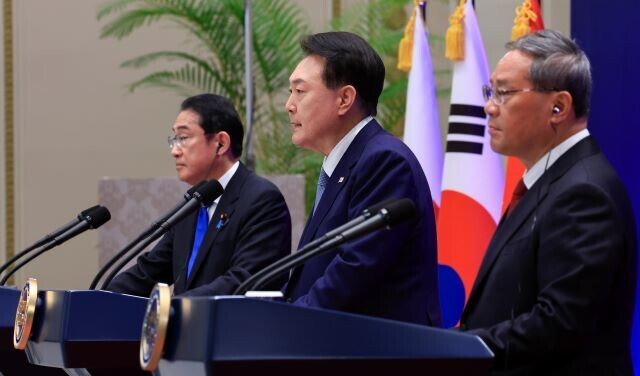hankyoreh
Links to other country sites 다른 나라 사이트 링크
Denuclearization will bring ‘power vacuum, hastened war,’ Pyongyang warns after Seoul summit

North Korea lambasted the joint declaration that South Korea released with China and Japan after their trilateral summit on Monday, saying any act to deny or violate North Korea’s position as a nuclear weapons state while preaching denuclearization will be regarded as “the most serious infringement” upon the North’s sovereignty.
The North Korean Ministry of Foreign Affairs declared that the possession of nuclear weapons is the regime’s “constitutional position” and that any calls for denuclearization are essentially calls for the dismantling of the North Korean constitution and regime.
The ministry published its response to the trilateral summit’s joint declaration via the Korea Central News Agency a mere three hours after the declaration was released.
“At a ROK-Japan-China tripartite summit held on Monday under the sponsorship of the ROK,” the statement read, “a ‘joint declaration’ calling for maintaining peace and stability on the Korean peninsula and in the region and denuclearizing the Korean peninsula was made public.”
The statement decried the “grave political provocation of denying the constitutional position of the DPRK,” adding that the Foreign Ministry “strongly denounces and rejects it as a blatant challenge to the sovereignty of the DPRK and wanton interference in its internal affairs.”
DPRK stands for Democratic People’s Republic of Korea, the formal name of North Korea, while ROK stands for Republic of Korea, the formal name of South Korea.
On Monday, South Korean President Yoon Suk-yeol, Japanese Prime Minister Fumio Kishida and Chinese Premier Li Qiang issued a joint declaration following their trilateral summit.
“We reaffirmed that maintaining peace, stability and prosperity on the Korean Peninsula and in Northeast Asia serves our common interest and is our common responsibility,” the document read.
“We reiterated positions on regional peace and stability, denuclearization of the Korean Peninsula and the abductions issue, respectively,” it went on.
The statement clarified that all three sides merely reiterated their prior positions on issues such as North Korea’s denuclearization. It did not mention any trilateral agreement on the issue. Yet North Korea still responded with vicious opposition.
On the surface, the statement was lambasting the joint declaration. Reading in between the lines, however, North Korea could be seen as sending a public message to China to not get involved in the denuclearization issue. In the current geopolitical situation, a trilateral summit between South Korea, Japan and China has the potential to massively disrupt China-North Korea relations.
The statement claimed that “the US nuclear threat” “triggered off the DPRK's access to nuclear weapons,” and that “hostile acts and military blackmail by the US and the ROK have been a decisive factor of accelerating the DPRK's steady advance for bolstering up its nuclear force.”
“Denuclearization on the Korean Peninsula means a power vacuum and hastened war,” the statement warned.
North Korea stated that any concept of the “complete denuclearization of the Korean Peninsula” has “already died out theoretically, practically and physically.”
Pyongyang declared that it would “make crucial efforts to build a new mechanical structure in the region based on justice and equity.”
By Lee Je-hun, senior staff writer
Please direct questions or comments to [english@hani.co.kr]

Editorial・opinion
![[Column] How tragedy pervades weak links in Korean labor [Column] How tragedy pervades weak links in Korean labor](https://flexible.img.hani.co.kr/flexible/normal/500/300/imgdb/original/2024/0703/8717199957128458.jpg) [Column] How tragedy pervades weak links in Korean labor
[Column] How tragedy pervades weak links in Korean labor![[Column] How opposing war became a far-right policy [Column] How opposing war became a far-right policy](https://flexible.img.hani.co.kr/flexible/normal/500/300/imgdb/original/2024/0702/5017199091002075.jpg) [Column] How opposing war became a far-right policy
[Column] How opposing war became a far-right policy- [Editorial] Korea needs to adjust diplomatic course in preparation for a Trump comeback
- [Editorial] Silence won’t save Yoon
- [Column] The miscalculations that started the Korean War mustn’t be repeated
- [Correspondent’s column] China-Europe relations tested once more by EV war
- [Correspondent’s column] Who really created the new ‘axis of evil’?
- [Editorial] Exploiting foreign domestic workers won’t solve Korea’s birth rate problem
- [Column] Kim and Putin’s new world order
- [Editorial] Workplace hazards can be prevented — why weren’t they this time?
Most viewed articles
- 1South Koreans living near border with North unnerved by return of artillery thunder
- 2Car behind deadly crash began rapid acceleration after exiting underground garage
- 3S. Korea “monitoring developments” after report of secret Chinese police station in Seoul
- 4Democrats ride wave of 1M signature petition for Yoon to be impeached
- 510 days of torture: Korean mental patient’s restraints only removed after death
- 6Hyundai Motor sets up one-stop shop for EV production in Indonesia
- 7[Editorial] Korea needs to adjust diplomatic course in preparation for a Trump comeback
- 8[Column] How tragedy pervades weak links in Korean labor
- 9Families, friends mourn loved ones cut down in prime in deadly car crash
- 10Samsung barricades office as unionized workers strike for better conditions